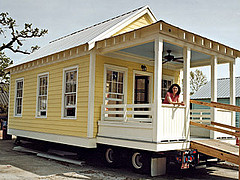Photo: Affordable Housing Institute
Cross-posted from Natural Resources Defense Council.
One of the more creative ideas to emerge in those hectic (and, for some, tragic) days following Hurricane Katrina was the invention of “Katrina Cottages,” sturdier and, to my eyes, much more attractive alternatives to the FEMA trailers typically used to house displaced residents. They are prefabricated and modular, and they can be constructed on site or placed on wheels and transported like conventional mobile homes. They are also designed so that they can be anchored in place to become fixed, permanent housing. There are now many variations, but these attributes are common to all.
I am proud to say that several of my friends were involved in the cottages’ design, under the auspices of a massive volunteer effort organized by the Congress for the New Urbanism called the Mississippi Renewal Forum. I was greatly impressed by the entire effort. I was also impressed by the cottages, in part because, where I come from, mobile homes are affordable housing for a lot of people. If thoughtful design can improve the genre, that is for the better, in my opinion. And, in fact, the concept is now being employed in an increasing number of applications beyond the original post-disaster concept. (You can read the history of the Katrina Cottages here.)
Image: Cedar Street Cottages
As I result, I was intrigued and pleased to read recently that a developer is planning to recycle 12 of the cottages that are no longer needed as temporary housing, using them as permanent housing on an infill site in the town of Buena Vista, Colo. Dustin Urban writes on the developer’s blog:
This unique infill project will feature 12 beautifully designed and built one and two-bedroom “Katrina Cottages” originally used as emergency housing after hurricane Katrina. With the majority offered for long-term lease, the cottages will offer downtown living within walking distance of schools, restaurants and shops. Located a block from East Main Street, the cottages will support a more prosperous Main Street business environment and will create a beautiful streetscape complete with sidewalks and street trees.
This is terrific. The developer’s principal project in Buena Vista, South Main, is interesting in itself, with green and fitness-oriented features. One thing its housing does not appear to be, though — at least so far — is small. Another part of the developer’s website trumpets a large, custom-built Spanish Colonial house on “a large lot” with “South Main’s most sizeable private outdoor space to date,” apparently intended to be used as a part-time residence.
This Katrina cottage was the first installation of the Seaside Academic Village.Photo: Seaside InstituteMeanwhile, in the iconic new urbanist resort town of Seaside, Fla., Katrina Cottages are being employed for a small educational facility. (Check out a 20-second video of the first cottage being transported into town and a six-second video of it being wheeled into place.)
Finally, Ocean Springs, Miss. is home to a mature, mixed-use enclave of some 23 Katrina Cottages on a two-acre site called Cottage Square. The project was developed by architect Bruce Tolar and Enterprise Community Partners, the national affordable-housing organization. Enterprise, which NRDC helped to establish an award-winning green housing program a few years ago, owns the project. It was built as a demonstration of the potential of the cottages, especially when employed together as a neighborhood.
Tolar has an office in the project, which also hosts a hair salon and real estate office in addition to homes. Lynn Lofton wrote in The Mississippi Business Journal:
The group of cheerful-looking cottages with their white picket fences and welcoming front porches are making a statement about alternative living in Ocean Springs. Cottage Square is being developed on a two-acre plot on Government Street near downtown of this walkable town. Planners hope it will serve as a model for the concept of mixed-use zoning and affordable housing. The cottages, built in a coastal style and painted pastel colors, are built to hurricane codes …
“We work with local governments and developers to help provide housing,” said Michelle Whetten, Gulf Coast director for Enterprise. “We were invited to participate by the Katrina Cottage Group because we share a lot of the same goals, and we wanted to demonstrate how these cottages can be used. We also share their emphasis for green, energy-efficient housing” …
She and Tolar believe the cottages are best when they’re in a planned group such as this one. “They work best in a group with a mix of styles, uses and income levels,” she said.
I have written before about the potential for cottage-sized housing, and think the Katrina model has advanced the possibilities. I hope it continues to catch on.
Here’s a very informative video tour of Cottage Square, discussing the cottages’ history and showing how the neighborhood can support a sustainable lifestyle:




